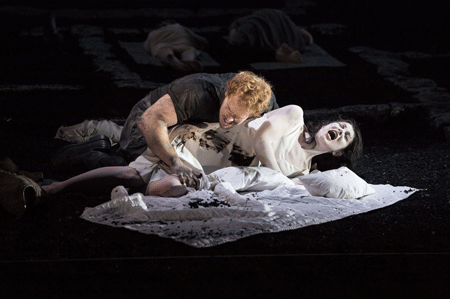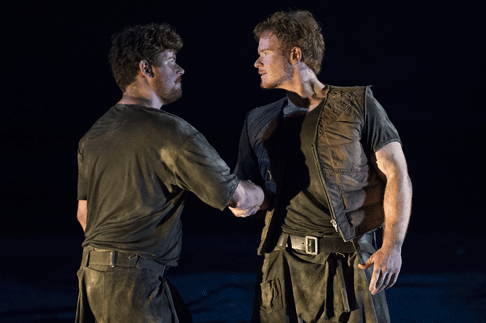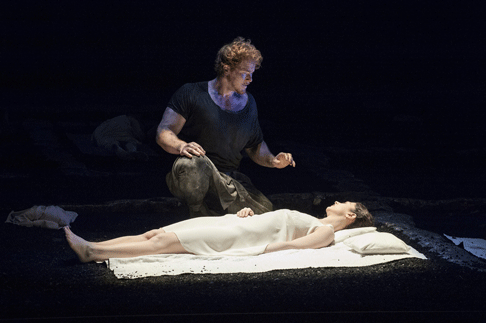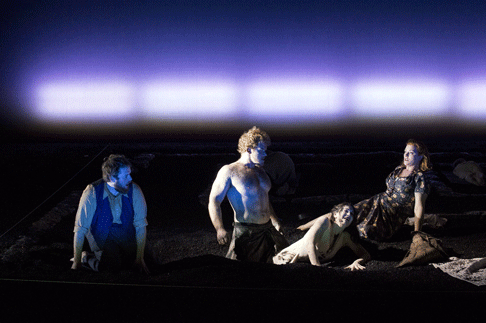
18 Nov 2013
The Rape of Lucretia, Glyndebourne Touring Opera
‘If she is adulterous, why is she praised? If chaste, why was she put to death?’
English Touring Opera are delighted to announce a season of lyric monodramas to tour nationally from October to December. The season features music for solo singer and piano by Argento, Britten, Tippett and Shostakovich with a bold and inventive approach to making opera during social distancing.
This tenth of ten Live from London concerts was in fact a recorded live performance from California. It was no less enjoyable for that, and it was also uplifting to learn that this wasn’t in fact the ‘last’ LfL event that we will be able to enjoy, courtesy of VOCES8 and their fellow vocal ensembles (more below …).
Ever since Wigmore Hall announced their superb series of autumn concerts, all streamed live and available free of charge, I’d been looking forward to this song recital by Ian Bostridge and Imogen Cooper.
Although Stile Antico’s programme article for their Live from London recital introduced their selection from the many treasures of the English Renaissance in the context of the theological debates and upheavals of the Tudor and Elizabethan years, their performance was more evocative of private chamber music than of public liturgy.
Evidently, face masks don’t stifle appreciative “Bravo!”s. And, reducing audience numbers doesn’t lower the volume of such acclamations. For, the audience at Wigmore Hall gave soprano Elizabeth Llewellyn and pianist Simon Lepper a greatly deserved warm reception and hearty response following this lunchtime recital of late-Romantic song.
For this week’s Live from London vocal recital we moved from the home of VOCES8, St Anne and St Agnes in the City of London, to Kings Place, where The Sixteen - who have been associate artists at the venue for some time - presented a programme of music and words bound together by the theme of ‘reflection’.
'Such is your divine Disposation that both you excellently understand, and royally entertaine the Exercise of Musicke.’
‘And there was war in heaven: Michael and his angels fought against the dragon; and the dragon fought and his angels, And prevailed not; neither was their place found any more in heaven … that old serpent … Satan, which deceiveth the whole world: he was cast out into the earth, and his angels were cast out with him.’
There was never any doubt that the fifth of the twelve Met Stars Live in Concert broadcasts was going to be a palpably intense and vivid event, as well as a musically stunning and theatrically enervating experience.
‘Love’ was the theme for this Live from London performance by Apollo5. Given the complexity and diversity of that human emotion, and Apollo5’s reputation for versatility and diverse repertoire, ranging from Renaissance choral music to jazz, from contemporary classical works to popular song, it was no surprise that their programme spanned 500 years and several musical styles.
The Academy of St Martin in the Fields have titled their autumn series of eight concerts - which are taking place at 5pm and 7.30pm on two Saturdays each month at their home venue in Trafalgar Square, and being filmed for streaming the following Thursday - ‘re:connect’.
The London Symphony Orchestra opened their Autumn 2020 season with a homage to Oliver Knussen, who died at the age of 66 in July 2018. The programme traced a national musical lineage through the twentieth century, from Britten to Knussen, on to Mark-Anthony Turnage, and entwining the LSO and Rattle too.
With the Live from London digital vocal festival entering the second half of the series, the festival’s host, VOCES8, returned to their home at St Annes and St Agnes in the City of London to present a sequence of ‘Choral Dances’ - vocal music inspired by dance, embracing diverse genres from the Renaissance madrigal to swing jazz.
Just a few unison string wriggles from the opening of Mozart’s overture to Le nozze di Figaro are enough to make any opera-lover perch on the edge of their seat, in excited anticipation of the drama in music to come, so there could be no other curtain-raiser for this Gala Concert at the Royal Opera House, the latest instalment from ‘their House’ to ‘our houses’.
"Before the ending of the day, creator of all things, we pray that, with your accustomed mercy, you may watch over us."
The doors at The Metropolitan Opera will not open to live audiences until 2021 at the earliest, and the likelihood of normal operatic life resuming in cities around the world looks but a distant dream at present. But, while we may not be invited from our homes into the opera house for some time yet, with its free daily screenings of past productions and its pay-per-view Met Stars Live in Concert series, the Met continues to bring opera into our homes.
Music-making at this year’s Grange Festival Opera may have fallen silent in June and July, but the country house and extensive grounds of The Grange provided an ideal setting for a weekend of twelve specially conceived ‘promenade’ performances encompassing music and dance.
There’s a “slide of harmony” and “all the bones leave your body at that moment and you collapse to the floor, it’s so extraordinary.”
“Music for a while, shall all your cares beguile.”
The hum of bees rising from myriad scented blooms; gentle strains of birdsong; the cheerful chatter of picnickers beside a still lake; decorous thwacks of leather on willow; song and music floating through the warm evening air.

‘If she is adulterous, why is she praised? If chaste, why was she put to death?’
Fiona Shaw’s new production of Britten’s problematic second opera, The Rape of Lucretia, doesn’t quite succeed in answering St Augustine’s question, but it does powerfully communicate the work’s troubling dramatic power and relevance.
This Britten centenary year has brought forth a chest of treasures, familiar and rare. Amid the countless offerings, at home and abroad, of the operatic favourites - from Peter Grimes to Death in Venice - we have enjoyed several renditions of the Canticles and Church Parables, performances of Paul Bunyan and Owen Wingrave, and innumerable masterpieces of the chamber repertoire: ranging from the abstractions of Our Hunting Fathers to balletic presentations of Phaedra, with scarcely a song or chamber work neglected, including Britten’s juvenilia.

But, Lucretia is a tricky one. Even the television opera, Owen Wingrave - which can sit uncomfortably in a theatrical context and presents characters with whom it is hard to empathise - communicates its ‘meaning’ more directly: whether we consider it a ghost story, anti-war manifesto or psycho-sexual drama, Wingrave is obviously ‘about’ something. But, Lucretia’s ‘message’ is equivocal and elusive; and, this is not wholly the fault of Ronald Duncan’s dreadfully verbose libretto - how, for example, is a composer supposed to respond to lines such as ‘and always he’d pay his way/ With the prodigious liberality/ Of self-coined obsequious flattery’?
Part of the problem lies in the tale itself. In the Roman account, there are no ambiguities: Lucretia kills herself for socio-political reasons - her husband’s power, social status and honour depend upon her virtue. In Shakespeare’s poetic narrative, Lucrece exhibits a guilt which is laden with Christian misogyny: she is beautiful, and her loveliness and purity has provoked Tarquin’s natural, masculine sexuality - so it’s her fault, like Eve, and the least she can do for the sake of everyone else is finish things off quickly.
Britten’s opera shifts between the two positions. We begin in a Roman military camp beside the Tiber, the formal device of the Male and Female chorus distancing us from the action in the manner of Greek tragedy. Indulging in crude banter, the boisterous soldiers praise Lucretia’s steadfastness and goodness, and the Male Chorus acknowledges, ‘Collatinus is politically astute to choose a virtuous wife./ Collatinus shines bright from Lucretia’s fame’.
However, contradicting this ‘historical’ focus, in their first lines the Choruses announce, ‘We’ll view these human passions and these years/ Through eyes which once have wept with Christ’s own tears’, establishing a specifically Christian perspective, one confirmed in Lucretia’s dying words, ‘See, how my wanton blood/ Washes my shame away!’ And, then there is the Christian epilogue which offers salvation to the participants’ despairing cry, ‘Is this all?’: ‘Jesus Christ. He is all! He is all!’ It’s all rather confusing.
Fiona Shaw and her design team (sets Michael Levine, lighting Paul Anderson, costume Nicky Gillibrand) opt for desolation with scarce hint of salvation. A bleak, raked stage, covered with earth overlain with a grubby black cloth, is dimly lit. Throughout the opera, the characters struggle to climb this incline, a physical manifestation of their worldly troubles and inner torments, and turn from us to peer into the delicate blue light which glows from afar - an elusive emblem of hope perhaps, but ever unattainable.
The cloth is raised with a single, central pole to form a dingy encampment. Drunken soldiers squat in the dark corners of the crowded tent, their fatigues reminding us that war, with its suffering and atrocities, is not merely an historical phenomenon. The Male and Female Choruses, dressed in dull 1940s clothing, are our conduit, via WWII, to this former era. In the libretto, the house curtain rises to show the Chorus ‘reading from books’; but Shaw literally digs her way back into antiquity, the Male Chorus scrabbling in a muddy pit from which Lucretia is later unearthed. Similarly, Collatinus’s house is an archaeological site, its perimeter marked by excavators’ tape, only a few foundation stones and rubble indicating its inner dimensions.
The gloom is ubiquitous, a cross-shaped standard lap providing weak illumination. Only at the start of Act 2, when Lucretia lies asleep, dreaming ‘the sunken treasures of heavy sleep’, does Anderson shine a gleaming white spotlight on her resting form, the sudden contrast powerfully evoking the purity of one who is ‘as light as a lily that floats upon a lake’. However, the glistening transparency proves poignantly fragile and defenceless against Tarquinius’ lust - ‘Loveliness like this is never chaste; If not enjoyed, it is just waste!’ Shaw shows us, explicitly and indisputably, how Tarquinius is driven to destroy the very beauty that he desires, Lucretia’s defilement taking place amid the earth and gravel of a dark, Hadean pit. At the end, it is from this pit that severed limbs and a head are unearthed; the Choruses’ closing religious consolations are bitterly unconvincing.

On 15th November, the young cast were on fine form. Andrew Dickinson and Kate Valentine were outstanding as the Male and Female Chorus respectively, engaging our interest and our feelings as they related and participated in the unfolding tragedy. Dickinson articulated Duncan’s literary turgidities with clarity and fluency, his delivery natural and unmannered but the sentiments heartfelt. Valentine sang with generous tone and warmth, always relaxed, blending beautifully with Dickinson in the duet refrain which punctuates the opera. The lullaby which the Female Chorus sings over Lucretia’s sleeping form was elegant and touching, enhanced by some exquisite playing by alto flute, bass clarinet and horn.
Britten and Duncan originally conceived the Choruses as commentators, relating a tale from the annals of Roman history (as the curtain falls on Act 1, they ‘pick up their books and continue reading’). At times, Shaw’s Choruses adopted a similarly distanced viewpoint but elsewhere they travelled back through time, and engaged and interacted with the past. So, as Dickinson related the account of Tarquinius’s nocturnal journey to Rome, his precipitous flight was mimed in the background while the Female Chorus tried to intercept and deter the dissolute Roman ruler as he recklessly lamed his horse and plunged into the Tiber, propelled by jealousy and lust. Such interaction added immediacy and deepened our empathy. The occurrences of the distant past have been undergone by many since: during WWII and in the present day. Shaw shows us that the story the Choruses tell, is their tale too; but, it does seem a step too far to suggest an intimate sexual attraction between the two Choruses …
The role of Lucretia was originally written for Kathleen Ferrier; Claudia Huckle may not possess a voice of such ample fullness, but after a slightly hesitant start she produced an intense and affecting performance. She acted with intelligence and commitment. A voice that initially embodied lightness and composure, transmuted after her violation to darker tones conveying vulnerability and self-castigation. Her confession was rich, mobile and expressive, her exposure unveiling a troubling guilt as Tarquinius’s desire became her crime. Huckle’s Lucretia is no artificial idol; rather she is a real, flesh-and-blood woman, shocked and destroyed by her own unbidden passions.
Duncan’s libretto depicts the rigid divisions in Roman society between male and female groups. Here, the Etruscan soldiers were crude, misogynistic competitors, convincingly brazen and coarse. In contrast, Ellie Laugharne’s lively, bright Lucia and Catherine Wyn-Rogers pure-toned Bianca suggested honest, uncomplicated friendship and love within the female domain.
Oliver Dunn revealed an appealing baritone and sure dramatic instincts as Junius. David Soar presented a well-rounded Collatinus, his strident Act 1 soliloquy on ‘love’ giving way to tender and profound sincerity following Lucretia’s confession, supported by rising woodwind and harp accompaniment gently intimating hope; ironically his forgiveness merely exacerbated Lucretia’s remorse.
As Tarquinius, Duncan Rock was fittingly assertive and muscular, although his aggression and brashness was modulated by moments of lyricism. Enraged by taunts and boasts, stirred by Lucretia’s beauty and virtue, his passionate outburst before his assault was poetic and ecstatic.
After the rape, Rock sadly conveyed a sense of his own loss - ‘Though I have won/ I’m lost./ Give me my soul/ Again/ In your veins sleep/ My rest.’; his Tarquinius was to be both censured and pitied.

Britten’s score is sparse, fitting for the post-war cultural climate when the work was composed, and ideal for our own ‘age of austerity’. In contrast to the drab bleakness on stage, the twelve instrumentalists conducted by Jack Ridley responded wonderfully to the transparent lucidities of Britten’s scoring. As Tarquinius crept through Lucretia’s house, the percussion’s nervous motifs skilfully depicted the explosive tension within the assailant. There was some enchantingly sensitive playing from harpist Sue Blair, and Alan Darbyshire’s silky cor anglais melody, above unsettling off-beat bass quavers, deepened the poignancy of Lucretia’s entrance preceding her confession.
In an article, ‘The Problems of a Librettist: Is Opera Emotionally Immature?’, Duncan suggested that the opera continued the dramatization of the conflict between the individual and society begun in Peter Grimes: ‘the individual is personified by Lucretia whose virtuous personality is persecuted, raped, by Tarquinius, who symbolises Society’. A more abstract reading might propose that the opera explores relationships between desire and violence, love and sin: after Lucretia’s death, the whole cast cry: ‘How is it possible that she/ Being so pure should die!’
But, for all the digging and delving, Fiona Shaw doesn’t find historical or philosophical ‘truth’: Lucretia’s suicide is presented more as a personal purgation than a social sacrifice, but the intimations of her guilt are neither confirmed nor eradicated. The Christian epilogue does not provide a redemptive framework: we do not equate Lucretia’s suffering with Christ’s crucifixion. But, this doesn’t matter. Shaw offers an intensely moving spectacle. As Lucretia herself says: ‘What I have spoken never can be forgotten.’
Claire Seymour
Glyndebourne Touring Opera will perform in Milton Keynes 19-23 November, Plymouth 24-30 November and Stoke-on-Trent 11/14 December.
Listen to the Rape of Lucretia podcast
Cast and production information:
Male Chorus, Andrew Dickinson; Female Chorus, Kate Valentine; Collatinus, David Soar; Junius, Oliver Dunn; Tarquinius, Duncan Rock; Lucretia, Claudia Huckle; Bianca, Catherine Wyn-Rogers; Lucia Ellie Laugharne; Director, Fiona Shaw; Conductor, Jack Ridley; Set Designer, Michael Levine; Lighting Designer, Paul Anderson; Costume Designer, Nicky Gillibrand; The Glyndebourne Tour Orchestra. Glyndebourne Touring Opera. The Marlowe Theatre, Canterbury, Friday 15th November, 2013.